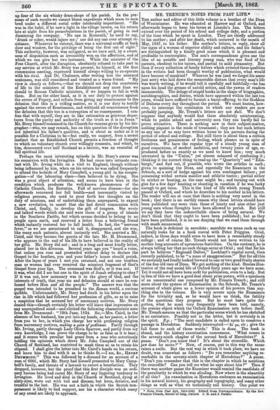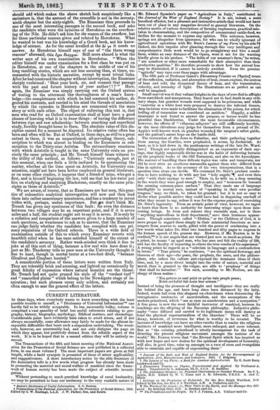MR. TRENCH'S NOTES FROM PAST LIFE.*
Tax author and editor of this little volume is a brother of the Dean of Westminster. He was educated at Harrow and at Oxford, and afterwards began to keep his terms at Lincoln's Inn. The letters extend over the period of his school and college days, and a portion of the time which he spent in London. They are chiefly addressed to his mother ; and after her death, which occurred in the month of May, 1827, to his father. ilia mother's letters, in reply, show all the signs of a woman of superior ability and culture, and his father's are distinguished by a kindly good sense which it is pleasant and profitable to contemplate. The son's correspondence gives one the idea of an amiable and literary young man, who was fond of his parents, obedient to his tutors, and partial to mild pleasantry. But then if every collection of family letters which evinced these qualities in the writers had been thought worthy of publication, what would have become of mankind? Whoever he was (and we forget his name just now) who laid down the memorable dictum that every man's life was worth writing, if he would tell it carefully and faithfiLly—he has upon his head the groans of untold critics, and the yawns of readers innumerable. The deluge of stupid books in the shape of biographies, autobiographies, and diaries, which have appeared within the last ten years, would have sufficed to furnish a burnt-offering to the Goddess of Dulness every day throughout the period. We must hasten, how- ever, to intercept the conclusion to which our readers are now probably jumping. Mr. Trench's letters are not dull. We don't suppose that anybody would find them absolutely uninteresting, while to public school and university men they can hardly fail to prove attractive. There is nothing new in their subject-matter, nothing piquant in the mode of treatment; they are but such letters as any one of us may have written home to his parents during the period of school and college. But still there is about them a certain freshness and genuineness of feeling, which pleases us in spite of ourselves. We have the regular type of a steady young man of good connexions, of modest ambition, and twenty years of age, re- produced before us exactly as we used to know him; very much interested in the "Union," yet almost ashamed of confessing it ; thinking it the correct thing to read up the "Quarterly" and "Edin- burgh," and find out, if possible, who wrote the articles in each; given to quizzing the Dons, and especially the Examiners in the Schools, as a sort of hedge against his own contingent failure; yet possessing withal certain manlier and athletic tastes ; partial either to cricket or boating, as the case might be ; and turning out with glee for a few days' hunting or shooting in vacation if he was lucky enough to get them. This is the kind of life which young Trench passed at Oxford, and which he describes to his mother in his letters. The reader will see at once that there is nothing very novel in the book; that there is no earthly reason why these letters should have been published any more than those of ninety and nine other just young men whose thoughts have been allowed to perish. But still we say they have the indescribable charm of being natural. We don't think that they ought to have been published; but as they have been published, it is no use denying that we read them through with much amusement.
The book is deficient in anecdote: anecdote we mean such as one naturally looks for in a book coeval with Peter Priggins. Oriel, indeed, in those days would seem to have been a remarkably steady college : and of course Mr. Trench would not have written to his mother long accounts of uproarious festivities. On the contrary, he is always telling her that no such things occur at Oriel ; and that for his part he believes "Reginald Dalton," Lockhart's capital novel, then recently published, to be "a mass of exaggerations." But for all this we certainly had fondly looked forward to one or two good fruity stories of the fine old race of bons. We get nothing of the kind. Stories illus- trative of the real social life of Oxford forty years ago we have none. Yet it could not all have been unfit for publication, even to a lady. But in lieu of this we have a good deal about prize poems, with a specimen of an unsuccessful one composed by Mr. Francis Trench; and still more about the system of Examination in the Schools, Mr. Trench's account of which gives us a lower opinion of his powers than any. thing else in the volume. He is very severe upon the Examiners for the triviality and, as he would have us think, the futility of the questions they propose. But he must have quite for- gotten, what he must very frequently have been told, namely, the precise object which the Oxford Examination sets before itself. Mr. Trench assures us that the particular scene which he has sketched is no caricature. Possibly not in the letter, but it certainly is in the spirit. E.g.: "The next candidate is called upon to construe a passage in Herodotus. Suddenly interrupted= ai ye, sir ; give the full force to each of those words.' This is done. The book is closed, and the history examination commences. 'What comes in the seventy-ninth chapter of the second book of Herodotus?' A pause. Don't you know that? It's about the crocodile. Which jaw does he move ?' " Now, of course, put in this way the scene raises a smile. But the real way in which it took place, we have no doubt, was somewhat as follows : "Do you remember anything re- markable in the seventy-ninth chapter of Herodotus ?" A pause. "Don't you remember that this is the chapter in which Ile mentions the crocodile? Can you tell me what he says about him ?" Then if there was another pause the Examiner would remind the candidate of the peculiarity to which he was alluding. Now where is the absurdity of all this? An examination in Herodotus embraces an examination in his natural history, his geography and topography, and many other things as well as what we technically call history. One point we * Notes from Past Afe, 1818-1832. Edited from Correspondence. By the Rev. Francis Trench, Rector of Islip, Oxford. J. H. and J. Parker. should add which makes the above sketch look suspiciously like a caricature is, that the account of the crocodile is not in the seventy- ninth chapter but the sixty-eighth. The Examiner then proceeds to one of the most interesting passages in the second book, and asks the candidate what were the opinions of Herodotus on the overflow- ing of the Nile. He didn't ask him for the reason of the overflow, but for three particular reasons given and refuted by Herodotus. 'What he wanted to test was his knowledge of a Greek book, not his know- ledge of science. As for the sneer levelled at the ai ye it needs no answer. As Herodotus himself says of one of "the three wrong reasons" aforesaid, obx xaAeyxow. Still more absurd is what the writer says of his own examination in Herodotus. "When the editor himself was under examination for a first class he was put on in Herodotus, at one of the chapters in the middle of one of his long rambling stories, which are not less amusing than, at times, un- connected with the historic narrative, except by most trivial links. After he had construed the chapter without interruption, the Examiner sharply exclaimed: 'Shut your book, sir, and connect that passage with the past and future history ofyour author ! ! !' " Here, again, the Examiner was simply carrying out the Oxford system of testing to the uttermost the. thoroughness of a man's know- ledge—the completeness with which he had mastered his author, di- gested his contents, and carried in his mind the threads of association by which the episodes in Herodotus are connected with the main story or with each other. The object of enforcing this test is, that men who read for an Oxford examination shall at least have a good chance of learning- what it is to know things : of having the difference between ripe and raw scholarship: between searching and superficial study, forcibly brought home to them. The absolute value of this dis- cipline cannot for a moment be disputed. Its relative value often has been and often will be. But at Oxford, in those days, as still to a great extent in these, it was an unquestioned, all-pervading theory, sub- scription to which was almost as binding on the Examiners as sub- scnption to the Thirty-nine Articles. The extraordinary exactness with which Aristotle is taught in the same University rests on pre- cisely the same principle ; and Mr. Trench himself bears witness to the utility of this method, as follows : "Curiously enough, just at this moment, when one feels a little inclined to be questioning the matter, whether all the time spent on Aristotle, for University exa- mination, might not have been better employed on general literature, or on some other studies, it happens that a friend of mine, who got a first, and is himself beginning the law, told me that his law-tutor put him on studying and analyzing Blackstone, exactly on the same prin- ciples as those of Aristotle."
We are aware, of course, that as Examiners are but men, this prac- tice of exhaustive analytical interrogation will now and then lead them into rather unnecessary minuteness, and has a tendency to invest trifles with, perhaps, undue importance. But ire don't think Mr. Trench has given any specimens of 'this fault : for even the distance between two villages may be an important point, and if it is seven miles and a half, the student ought not to say it is seven. It is only by a collation and comparison of the answers given to a large number of such questions, as wearisome to ask as to answer, that the Examiner can judge fairly whether the candidate has complied with one pri- mary requisition of the Oxford schools. There is a wide field of examination outside of this to which every Examiner reverts with heartfelt relief when he has once satisfied himself of the extent of the candidate's accuracy. Rather weak-minded men think it fine to joke at all this sort of thing, because a few real wits have done it ; just as Mr. Thackeray tells us poor men at the University thought it fine to hunt, though in mortal terror at a two-foot ditch, "because Glenlivat and Cinqbars hunted." I considerable portion of these letters were written from Italy. They are tolerably brisk and amusing, and lighted up occasionally by great felicity of expression where natural beauties are the theme. Mr. Trench had not quite pruned his style of the "verdant turf" and "enamelled plains" which belong to the Newdigate stage of in- spiration; but such phrases occur only seldom, and certainly not often enough to mar the general effect of the letters.































 Previous page
Previous page